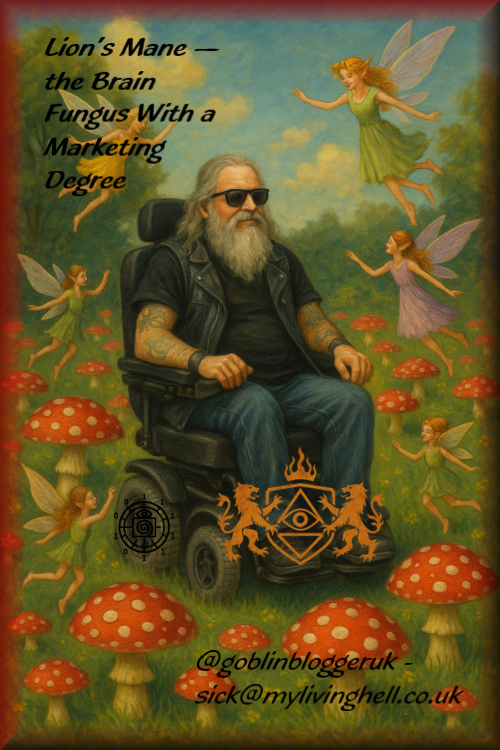- Posted on
⚠️ Please read with care: This blog shares personal, sometimes painful experiences. My intention is to support and speak honestly not to harm. I’m not a professional, just someone who understands how hard it can get. If you're struggling, you're not alone please reach out for professional help.
Mushrooms are not plants. They’re not animals. They’re the great in-betweeners, nature’s underground internet, recycling death into nutrients and occasionally blowing your head off with psilocybin visions. They’re also medicine, food, and for some of us, desperate hope in capsule form.
I’ve been taking Lion’s Mane mushrooms every day for about a year. Two capsules, 500 mg each. Do I feel like Einstein yet? Not really. Placebo? Possibly. Brain-food insurance policy? Definitely. Let’s look at the evidence, the folklore, and the sheer weirdness.
Lion’s Mane the Brain Fungus With a Marketing Degree
Lion’s Mane (Hericium erinaceus) looks like a frozen white waterfall or a wig for ghosts. It’s been used in traditional Chinese medicine for centuries. In the West, supplement sellers market it as “neuroprotective” and “cognitive boosting.”
What Science Says (so far):
Contains compounds called hericenones and erinacines, which in lab studies stimulate nerve growth factor (NGF) — the stuff that encourages neurons to survive and grow. (nih.gov )
Animal studies suggest Lion’s Mane can promote remyelination (repair of the nerve sheath) the dream ticket for people with MS. Early evidence, but promising.
Small human studies show modest improvements in cognitive function in older adults with mild cognitive impairment. Nothing blockbuster yet, but encouraging.
Anti-inflammatory and antioxidant properties the general “helps the body deal with stress” box ticked.
The Limits:
Clinical trials in humans with MS, Parkinson’s, or other neurodegenerative conditions? Very few, very small.
Supplements are unregulated. What’s in your capsule depends on the brand. Could be pure, could be sawdust.
Effects are subtle. Don’t expect to grow new neurons overnight. If you notice anything, it’s likely over months and alongside other lifestyle factors.
Mushrooms in General — The Fungal Pharmacy
It’s not just Lion’s Mane. Mushrooms are chemical factories with real power:
Reishi (Ganoderma lucidum): “The mushroom of immortality.” Immunomodulating, calming, possibly anti-cancer effects.
Cordyceps: Energy booster, oxygen uptake improver, libido aid. Essentially the creepy parasite of caterpillars turned into performance enhancer.
Chaga: Antioxidant powerhouse, skin and gut friendly. Looks like burnt charcoal but packs a punch.
Psilocybin (magic mushrooms): Illegal in most places, but clinical trials show strong effects on depression, PTSD, end-of-life anxiety. Sometimes one dose = months of relief.
Plain edible mushrooms (button, shiitake, oyster): Not flashy, but full of fibre, B vitamins, selenium, and beta-glucans that quietly help immunity tick along.
Why Fungi Deserve Respect
They’re not miracle cures, but they are ancient companions. They turn rot into food, they build soil, they create antibiotics (penicillin, anyone?), they connect forests through underground networks. And sometimes, they make your brain hum a little differently.
Lion’s Mane might not cure MS, but if it nudges your neurons, protects against fog, or just gives you the psychological boost of doing something for your brain, that’s still power. Placebo is still medicine if it gets you through another day.
Dark Humour Interlude
Doctors: “We need more evidence before recommending mushrooms.” Me: “Mate, I’d rather gamble on fungus than suffer another lumbar puncture.” The goblin in my head: “Eat the brain wig! Eat it!”
Conclusion
Mushrooms are nature’s weird little anarchists. They don’t play by plant or animal rules. They can kill you, heal you, feed you, or make you see God. Lion’s Mane sits in the hopeful corner: not a cure, not a fantasy, but maybe — just maybe — a slow ally for our damaged brains.
Until the trials are bigger, we’re left with capsules, tea, and stories. Brain food, goblin food, survival food. Long live the fungus.
I write in ink and fury, in breath and broken bone.
Through storm and silence, I survive. That is the crime and the miracle.
